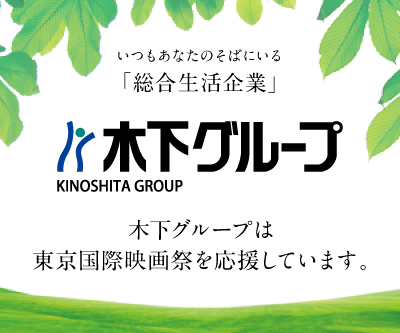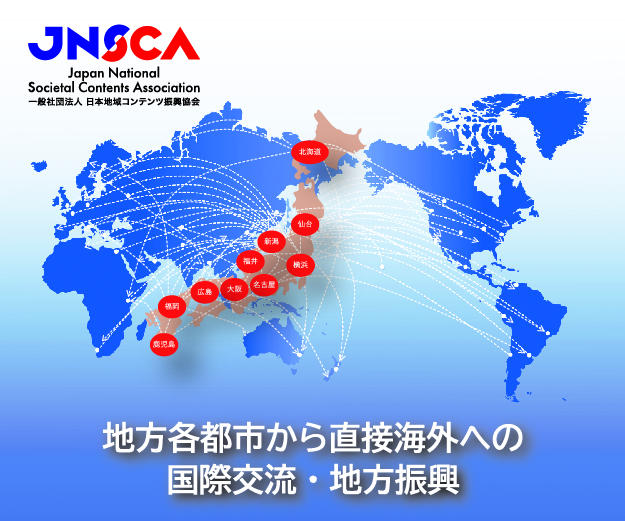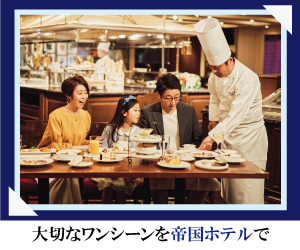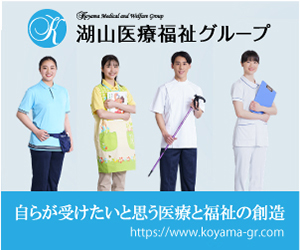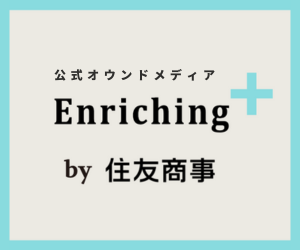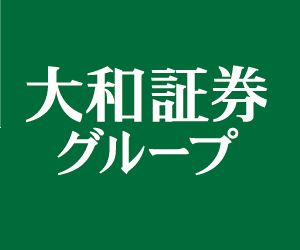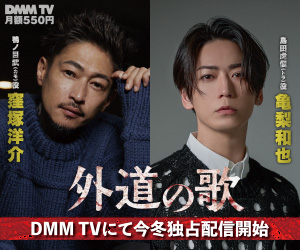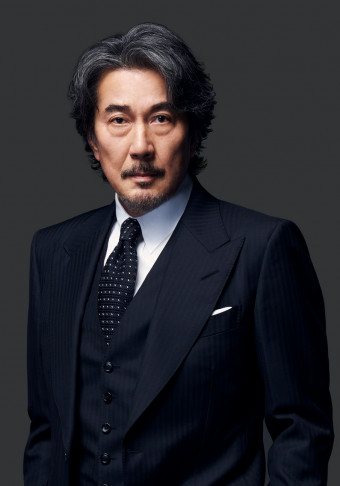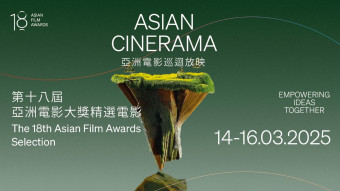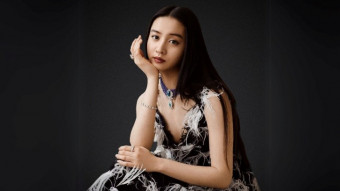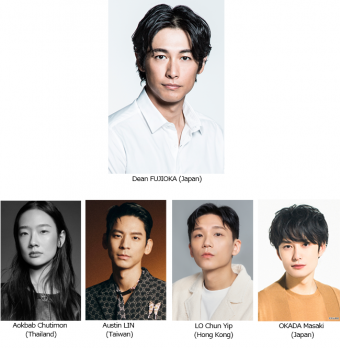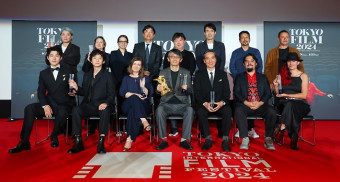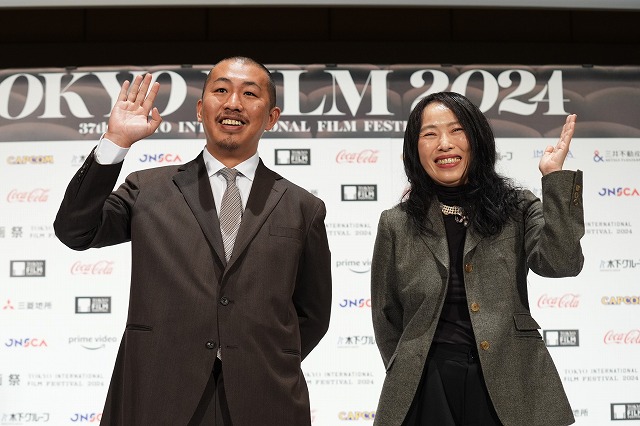
©2024 TIFF
The two recipients of the 37th Tokyo International Film’s Festival Kurosawa Akira Award sat down with the press on November 5, ahead of the official award ceremony at the Imperial Hotel, just steps away from TIFF’s main venue in Hibiya. Miyake Sho of Japan and Fu Tien-yu of Taiwan are both mid-career filmmakers, and have already received attention and awards for their work. But neither imagined they would be honored with the Kurosawa Akira Award, which promotes the renowned auteur’s legacy and ongoing influence through the selection of “directors with whom we can entrust the future of filmmaking.”
Fu told the press, “I’m so honored to receive this award. I was here about 10 years ago at the TIFFCOM project market, but never imagined I could win such an honor. Even now, I still can’t believe it. I saw Mr. Miyake’s Small, Slow But Steady, about a young woman who continues to box no matter what. In my film Day Off, the protagonist continues her job as a barber no matter what, which is similar. So it feels fitting that I’m winning this award with him.”
Said Miyake, “I [feel strange] sitting here all by myself up here, without the casts and crews that helped me make my films. I want to thank them for their wonderful job, which made it possible for me to win this award. I saw Ms. Fu’s Day Off and like her protagonist, who is so devoted to her work and does a great job at it, I’d love to think I could be like her [with my filmmaking] in the future.”
TIFF Programming Director Ichiyama Shozo, a member of the selection committee that voted on the Kurosawa Akira Award candidates, noted that they had been impressed by Miyake’s “depictions of daily life using such refined techniques, and we could see that he’s learned a lot from the past masters. We were sure that he would spread his wings to the world in the future, and that is why he was selected.”
As for Fu, Ichiyama commented, “In the 1990s, there was a wave of Taiwan New Cinema, represented by such masters as Hou Hsiao-hsien and Edward Yang. Their films were totally different from past films, depicting life in Taiwan realistically and sympathetically. Ms. Fu seems to have inherited this New Cinema movement and that’s why we chose her for the award. Her films also depict the daily lives of common people, and the woman in Day Off is actually her own mother.”
Ichiyama asked when they had seen their first Kurosawa Akira film, and Miyake responded, “I first saw a Kurosawa film when I was in sixth grade and watched High and Low on tape. A few years later, I was watching Bayside Shakedown, and there was this scene that looked familiar. I was the only one who’d seen High and Low, so I was telling my friends about how similar the scenes were, as if I were a film expert or something. When I started making films, there was no studio system. So the films by Kurosawa Akira felt different. I started watching his films and other classic films again and again, curious to see how they were made. I feel I’ve learned so much from them.”
Said Fu, “The first Kurosawa film I saw was when I was at university in Taiwan, and I was the head of a film society there. We watched most of his films. But the most impressive one for me was Ikiru, which depicts anger, joy and sadness, and was very moving. I noticed that this great director was depicting common people in a natural way, which is very difficult. I also read his biography and learned what kind of life he’d lived before he became a director.”
Asked what their filmmaking hopes were for the future, Fu responded, “Writing scripts is very tough, really exhausting. Whenever it’s especially hard for me, I watch interviews with Kurosawa-san on YouTube, and he says that writing scripts is like climbing a mountain. At first, you don’t see where you’re going, but when you reach the top you can look back and see your footsteps. That’s very encouraging to me. I’m currently writing a psycho-thriller film, which is different from anything I’ve done before. I’d like to put myself into it and make something truly unique.”
Miyake said, “My answer to that question is actually secret, but I’d like each of my films to be different from the others, in the same way that Kurosawa-san made films in different genres. I’d like to do something that’s completely different.”
Asked by a Taiwanese journalist how she felt about the future for young filmmakers in her country, Fu said, “Hou Hsiao-hsien and other great masters nurtured my generation. To think that I won the same award as Hou Hsiao-hsien is a huge honor. Of course my generation is different from Kurosawa Akira’s, but I feel that film is precious. The experience of going to a dark theater and sharing a film with others is irreplaceable.”
And she emphasized, “Although this award is such an honor, my goal isn’t to win awards but to keep making films.”
At a sumptuous black-tie event later that evening, leading lights of the Japanese film industry and notable international guests gathered at the Imperial Hotel for the Kurosawa Akira Awards Ceremony. TIFF Chairman Ando Hiroyasu welcomed guests with brief remarks, and after welcoming everyone, said: “This award was born because many younger filmmakers don’t know the work of Kurosawa Akira, and we wanted to help pass down his name and his spirit. This year’s Tokyo International Film Festival theme is ‘nurturing future filmmakers,’ so this award is a reflection of doing just that.” He also extended warm gratitude to CAPCOM, the underwriters of the awards, for their support.
Yamada Yoji, chair of the committee that had selected the awardees, then made remarks about how the selection was made. “Ms. Fu Tien-yu’s Day Off is a really lovely film, which depicts people with precision and warmth. Her cinematic expression is really state of the art. As I was watching her film, I was thinking, ‘Why can’t the Japanese make this kind of work?’”
“Miyake Sho’s work is also wonderful, especially his 2022 Small, Slow But Steady, which also portrays humans in a very respectful way. From his cinematic expression, we could see that he’s been learning from his predecessors, especially the way he shoots scenery. In a scene with a moving train, I realized that [the style] came from Ozu Yasujiro. I haven’t heard from him directly whether he learned from Ozu, but I hope to ask him tonight.”
He finished, “Congratulations to both wonderful directors.”
Following the screening of trailers highlighting their work, Miyake and Fu received crystal trophies presented by CAPCOM Chairman and CEO Tsujimoto Kenzo. The awards also come with a 1 million yen cash prize.
Miyake spoke first. Again expressing gratitude to his collaborators, without whom he wouldn’t be here, he said, “After I learned I would receive this award, my crew members called and we were celebrating. We thought, if we could all go to the ceremony together, maybe we could wear sunglasses like Kurosawa Akira. Of course they’re all very sophisticated. I’d like to continue making films. Thank you so much.”
After thanking the festival and the selection committee members, Fu said, “Yamada Yoji has been my idol for so long, I was just thrilled that I could meet him and talk to him face to face tonight. First, let me express my sincere gratitude to the 37th Tokyo International Film Festival and the selection committee for this honor. Whenever I see Yamada Yoji’s films, I feel like his characters are just like those in my world, and I feel like they could be in my films, too. I get great power from his work. I would love to see him make a Japanese version of Day Off in the future. ”
She concluded, “I will put all my heart and soul into making films in the future.”
The 2024 selection committee consisted of film director Yamada Yoji, casting director Narahashi Yoko, film critic Kawamoto Saburo and TIFF Programming Director Ichiyama Shozo.
PROFILES
Miyake Sho studied at the Film School of Tokyo and has forged a career making independent films. In 2012, his feature Playback premiered in Competition at the Locarno Film Festival and won domestic awards. His Small, Slow But Steady (2022) was invited to the Encounters section of the 72nd Berlin International Film Festival and more than 20 other festivals, and won many awards domestically, including the 96th Kinema Junpo Award for Best Japanese Film. All the Long Nights (2024) was presented in the Forum section at the 74th Berlin International Film Festival and many other festivals.
Fu Tien-yu received a master’s degree in Media Ecology and Film from New York University and began her creative career as a novelist, for which she received several prestigious literary awards, as well as a screenwriter. She made her directorial debut in 2009 with Somewhere I Have Never Travelled, followed by My Egg Boy in 2016. She has also directed award-winning TV films and numerous music videos. Day Off (2023) is her third theatrical feature.











